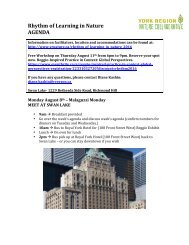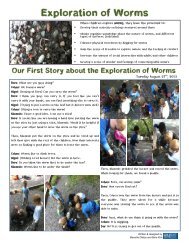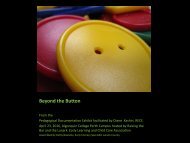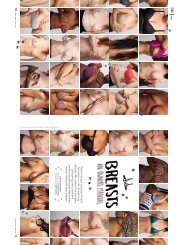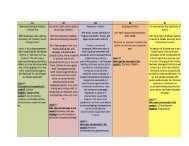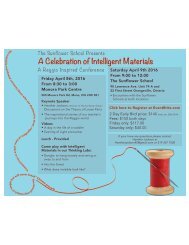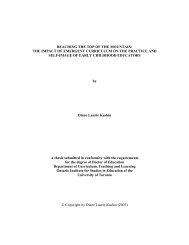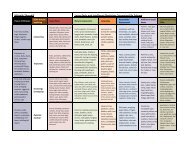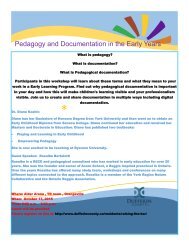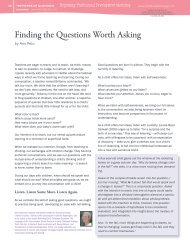Early Childhood Education Program Standard
Create successful ePaper yourself
Turn your PDF publications into a flip-book with our unique Google optimized e-Paper software.
<strong>Early</strong> learning environments - Child-centered environments that are focused on<br />
relationships between children, parents and early childhood professionals that<br />
provide, care, nurturing and education as a complex and coherent whole, with<br />
the goals of holistic development and overall well-being. It includes schedules,<br />
routines, physical environment, interactions, materials, activities and experiences<br />
(adapted from Best Start Expert Panel (2007). <strong>Early</strong> Learning for Every Child<br />
Today (ELECT): A Framework for Ontario <strong>Early</strong> Learning Settings).<br />
Ethical and professional standards - A core set of beliefs, values and<br />
responsibilities fundamental to this profession that serve to define the exemplary<br />
practices of early childhood education. The practice of <strong>Early</strong> <strong>Childhood</strong> <strong>Education</strong><br />
is regulated by the College of <strong>Early</strong> <strong>Childhood</strong> Educators in accordance with the<br />
<strong>Early</strong> <strong>Childhood</strong> Educator’s Act, 2007. It is the professional responsibility of all<br />
members of the College of <strong>Early</strong> <strong>Childhood</strong> Educators to meet and uphold the<br />
Code of Ethics and <strong>Standard</strong>s of Practice in their work in early learning settings.<br />
Evidence-based practice - The delivery of high quality early learning programs<br />
based on the best empirical evidence available, in conjunction with professional<br />
judgment (Best Start Expert Panel (2007). <strong>Early</strong> Learning for Every Child Today<br />
(ELECT): A Framework for Ontario <strong>Early</strong> Learning Settings).<br />
Family/families - A group of persons who are bound together over time by ties<br />
of mutual consent, birth and/or adoption/placement and/or legal guardianship<br />
who, together, assume responsibilities for physical, social, spiritual and emotional<br />
care of one another, addition of new members through procreation/adoption,<br />
socialization of children, and nurturance/love of one another.<br />
Generative Curriculum Model - A generative approach to Aboriginal early<br />
childhood education curriculum which focuses on developing curriculum from<br />
community-relevant knowledge sources e.g. Elders and other within the<br />
community and co-creating knowledge through shared experiences, reflection<br />
and dialogue (Ball, 2004, As if Indigenous Knowledge and Communities<br />
Mattered: Transformative <strong>Education</strong> in First Nations Communities in Canada).<br />
Holistic development - Describes an integrated approach to a child’s<br />
development, which takes into account the interrelationship among a child’s<br />
physical, emotional, intellectual, social, spiritual and cognitive development and<br />
life experiences, with special focus on the context of the child's family, culture,<br />
and community.<br />
Inclusive - An approach to practice in early learning settings where all children<br />
are accepted and served within a program and where each child and family<br />
experiences a sense of belonging and no child or family is stigmatized or<br />
marginalized. Inclusion means bringing people in rather than excluding them in<br />
thought, word or deed. Inclusive practice provides equal learning opportunity and<br />
full participation in all aspects of the early learning program by all children.<br />
<strong>Early</strong> <strong>Childhood</strong> <strong>Education</strong> <strong>Program</strong> <strong>Standard</strong> 20




